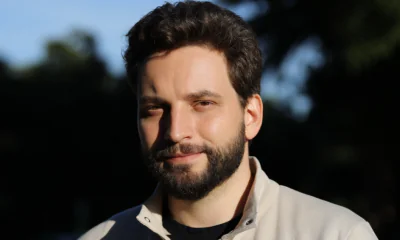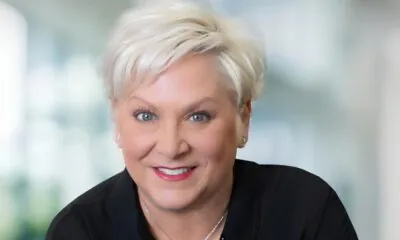Interviews
Andrei Papancea, CEO at NLX – Interview Series

Andrei Papancea, is the CEO at NLX a comprehensive SaaS platform for building and managing AI-powered conversational applications at scale.
Previously, he built the Natural Language Understanding platform for American Express, processing millions of conversations across AmEx’s main servicing channels.
You grew up in Romania and started programming when you were 10 years old. What attracted you to programming at such a young age?
It started off as curiosity: I’ve always been intrigued about how things worked and since my family has just gotten a computer, I wanted to figure out how it worked. It continued soon after with learning how to build websites for family friends’ businesses, which ended up getting me my first paycheck. Ever since then I’ve continued my passion for learning new things and I’m thankful that this has led to a career in something I love.
When did you realize that you were interested in machine learning?
I enjoy understanding and building the end to end. Working with applications of machine learning in practice was a natural progression of my career. My skills in the field of artificial intelligence started off while still in high school, with building small game solvers (traditional “AI”), and evolved at American Express where I leveraged natural language processing (NLP) technology to build AI-powered customer service.
You eventually moved to America, where you helped build a conversational AI platform from scratch for American Express. Could you discuss this project?
When I was applying to join American Express in May 2015, the job description had no mention of conversational AI in it. Yet, on the first day I was asked by my new manager whether I wanted to work on “boss”. I said I’m not quite sure what they entail, but that I was definitely interested. Fast-forward six months later, I deployed to production the first version of the conversational AI engine of American Express. By the time I left the company at the end of 2016, the engine had evolved into a conversational AI platform and it was handling the majority of the traffic on AmEx’s website and mobile application.
In 2018, you then launched NLX Inc. What was the genesis story behind NLX?
Post AmEx, I spent a few years consulting for companies looking to adopt conversational AI technology. After observing different use cases across industries and the overall size of the market, myself and two co-founders incorporated NLX Inc. in early 2018. While the market strategy has naturally adjusted, our technology platform and our vision to power conversational experiences everywhere have been consistent in allowing us to stay relevant and innovative to date.
Could you discuss some of the conversational AI applications that can be built using NLX?
Our NLX Studio platform is designed to accommodate the most custom use cases. Late 2019 we built a managed Amazon Alexa Skill that enables travelers to check in, book seat upgrades, check their flight status, and more, all done seamlessly via voice. The implementation includes insights, analytics, and integrations with the airline’s systems.
A few months back, we built a new conversational AI service on top of our platform called Voice Compass™. It delivers voice-guided, self-paced customer journeys – known as Voice Compass Journeys – that empower customers to complete routine tasks without having to talk to a real person. Customers set their own pace, verify their credentials, receive clear instructions, make selections from account-relevant options, and are rewarded at the journey’s end with task completion.
You can try out Voice Compass for free at here.
What are some of the use cases that you have seen from NLX clients?
We are fortunate to work with market-leading companies across industries and with big problems to solve. Lately, we’ve been working on a lot of applications for the airline industry, ranging from making personalized outbound calls to passengers with disrupted flights, to inbound call automation through the use of our multimodal technology service, Voice Compass. Another market sector we’ve been focusing on is energy utility companies, enabling their customers to self-service in setting up energy-saving IoT devices.
You’ve also participated in some hackathons in New York City, could you share one of the more interesting projects that was conceived during one of the hackathons?
One of my most iconic hackathons was a MasterCard hackathon called “Masters of Code”, where myself and a few friends got together and built one of the early applications for Amazon Alexa, which was just released a few months before. The hackathon took place in over 12 cities around the globe and the winner in each city would advance to the final stage of the competition, which took place in San Francisco. We won the NYC hackathon with a concept we called “Pay Butler”: a voice-controlled conversational experience built for Amazon Alexa that aimed to streamline grocery delivery for people with disabilities and those who cannot read. You could say “Alexa, ask Pay Butler to order two packs of rice and a pound of tomatoes” then you were prompted to pay with your card on file. We advanced to the final round of the hackathon in San Francisco, where we came in second with an early push for conversational commerce.
You’ve been an Adjunct Professor at Columbia University in New York since December 2019. What have you learned from this experience?
My teaching experience started in 2017 when one of my former Columbia University professors asked if I could give a lecture in his Cloud Computing course. The lecture was a great success. It ended up with me giving more lectures the next semester as well as designing all the assignments for the course. Fast-forward a few years, I teach several lectures each semester and I design the assignments for both Columbia University’s and NYU’s Cloud Computing courses. Over 50% of the 80+ students in the Spring 2019 course at Columbia obtained AWS internships that summer. In retrospect, helping students obtain practical engineering skills and succeeding in getting top-tier jobs is a very rewarding experience. Moreover, teaching contributed to my personal growth because in order to efficiently communicate technical concepts forced me to obtain a deeper understanding of the field.
Is there anything else that you would like to share about NLX?
First of all, our HQ is in the heart of New York City, with a growing presence in Seattle, California and Berlin, Germany – and proudly diverse hiring practices. Next, we partner closely with AWS on multiple fronts: as an AWS Advanced Technology Partner, as an AWS Travel & Hospitality Competency Partner, and as both an Amazon Connect and Amazon Pinpoint technology partner.
We focus on the experiential part of AI by putting tools in the hands of people who don’t need to know programming, but do focus on cost optimization and user experience. Finally, we’re one of the only AI companies to have a fully-operational free demo for users to try. You can check it out at experience.voicecompass.ai.
Thank you for the interview, readers who wish to learn more should visit NLX.












